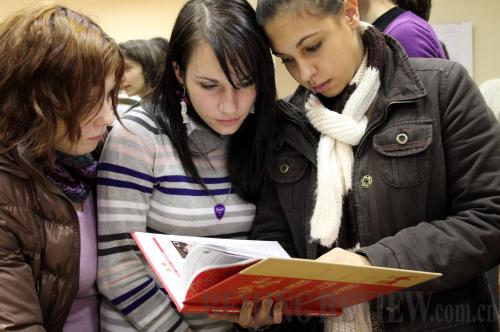|
 |
|
(XINHUA) |
In order to begin the study of Chinese culture, we must first acknowledge that it is so completely different from our own, that any cultural or political parallels that we draw between the two civilizations are by their very nature almost bound to be wrong.
Boasting an impressive 5,000 years of civilization, China is steeped in glorious history. Many Chinese struggle to recall specific dates and events, so foreigners don't stand much chance. For many Westerners, watching Bruce Lee and Jackie Chan movies are the only means of trying to unravel this mysterious world. Most accurate history books are in Chinese and therefore inaccessible to foreigners. So what can we do?
There is one way to scratch the surface—the language. Mandarin has evolved over time like any other language, and to study it offers a riveting insight into contemporary China.
"Chi fan le ma (Have you eaten)?" is the question on everybody's lips in the past—How does one answer, though? They say it means "How are you?" What if you are fine, but you haven't eaten? Conversely, what if you have eaten but you're not okay?
A long time ago, before China had begun its magnificent economic ascent, life for most was simple at best. Food was not in vast supply and nor was anything else. Therefore, asking whether one had eaten or not was the same as asking how somebody was. If you had eaten—you were okay—what else could you have realistically wanted? To be full of food and still not content is normal for many today—but not for the Chinese of yesteryear.
When I pass a colleague in a corridor at work, I ask how he/she is, using Mandarin. Each time, I receive a strange look as if I have asked a weird question. The literal translation of "How are you?" is "Ni zen me yang?" but translating in this manner is usually useless, and so it proves in this instance. The Chinese simply say other things, such as the aforementioned "Ni chi fan le ma?" What I found was that when I asked "Ni zen me yang?" casually in the corridor, my colleague almost always interpreted it as me genuinely trying to delve into their feelings and emotions. He or she would stop walking, lower their eyebrows with curiosity, and tell me in a rather embarrassed fashion that they are okay and then ask me why exactly I had asked the question. We use the question to greet—but Chinese people seem to feel obliged to give an in-depth answer.
Some of the questions asked regularly by Chinese people offer a particularly intriguing insight into the local culture today. For example, asking somebody you just met how much they earn every month would be rude in the West. Here, it is not. "At what age will you get married?" is another extremely common question. The concept of marriage here is at odds to many Western cultures. We tend to "let it be"—and therefore find that question impossible to answer—whereas the Chinese "make it be." Generally, family values are strong here and creating one of your own is paramount in every Chinese household. Just by briefly analyzing why the Chinese ask these kinds of questions, we can start to understand a little more about the way the country is today, and how it might have been in the past.
Some common structures (translated into English) for questions about anywhere outside of China go as follows: Do foreigners eat rice? Does "foreign land" use chopsticks? You foreigners are extremely open-minded, aren't you? It is very easy to become frustrated by this line of questioning because it can seem as if the Chinese paint the other 200+ countries' cultures in the world with the same brush. Every country is proud of its unique culture and there is a huge difference between the culture of a person from Sweden and a person from Argentina, but, because they are both white Westerners, they are put in the same box. Only by studying Mandarin are we exposed to this mind-set—and only by being exposed to it do we begin to ask why it's the case. You don't have to search hard to find the answer. Many developed Western countries have a long history of people from overseas immigrating to their shores. Countries like the United States and Britain are indeed two of the most multi-cultural countries in the world. China was closed to outsiders until very recently, and although it is very diverse in its own way, has had relatively little exposure to other civilizations or cultures. As a result, in England at least, we tend to specify the country when asking a question to a foreigner, whereas the Chinese do not. If you are not Chinese—you are an outsider—it's as simple as that. As China has more interaction with the West, I'm confident that this will change.
We will never know everything about China's past, but one way to try to understand its present is by learning its language. The more I learn about this vast and varied country the more I realize I don't know—but one thing I'm sure of is that living in China without studying Mandarin only grants you access to a fraction of what is a truly fascinating culture.
The author is a Briton living in China | 